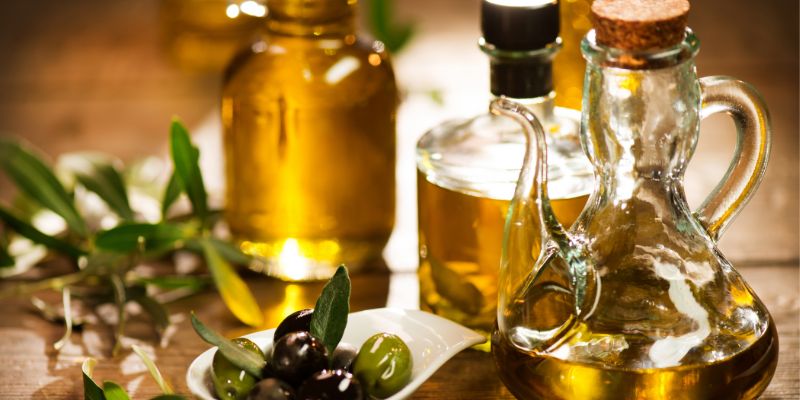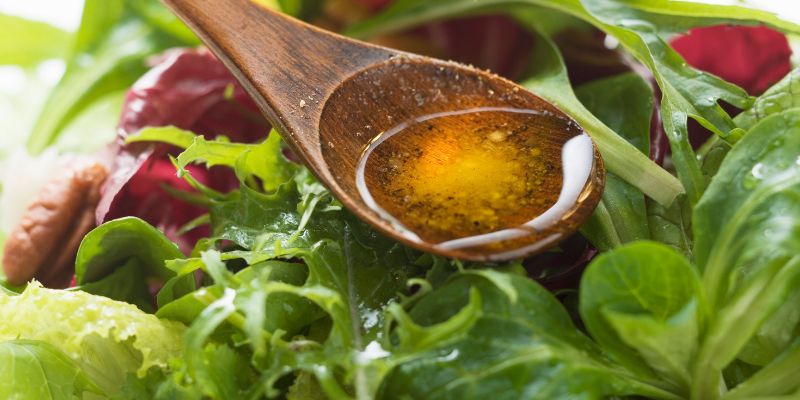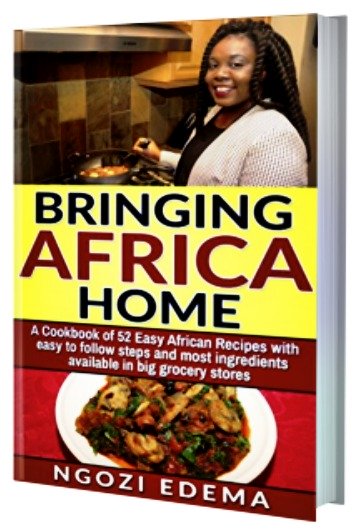Why Extra Virgin Olive Oil?
Extra virgin olive oil lovers? We know how important it is to have this oil in our pantry. We need it for sauteeing, frying, and the main ingredient in salads, marinades, and dips. Some drink it. And it is used to make cosmetics and soaps and as fuel for traditional oil lamps.

Extra virgin olive oil is top of the range in the world of fats and oils. By the way, it is part of a healthy diet in moderation. Olive oil is a liquid fat obtained by pressing whole olives. It is a staple in the Mediterranean diet.
And today, the benefits of olive oil, especially extra virgin olive oil, have spread everywhere. It is the main ingredient in many traditional and modern dishes. And rightly so, for all the goodness of this oil.
What You Should Know When Buying Extra
Virgin Olive Oil
In many grocery stores, you will find olives labelled as
- Extra Virgin Olive oil
- Virgin Olive Oil
- Pure Olive Oil
Olive oil is the top oil for cooking. Great in salads, marinades, and dips.
Back in the day, when I was not familiar with these labels, I was often confused about what to buy. Now I know better.
The name assigned to the different types of olive oil describes how it was extracted and refined.
Extra-virgin olive oil is the oil extracted from pure, cold-pressed olives. The oil takes on the fruity, green flavour of fresh olives.
A further crushing or pressing and filtering of the olives creates a milder-tasting virgin olive oil. Virgin olive oil may come from olives that may have been slightly damaged or overripe.
Whatever remains from crushing the olives for the two types described above go through extensive processing, and you get pure olive oil. This refined oil has a milder flavour and is a blend of cold-pressed and processed olives.
Extra virgin oil is the best as it retains the health benefit of olive oil due to no processing. Olives are cold-pressed to extract the oil. When the further pressed, you get the virgin oil. Extra virgin oil is the oil from the first pressing.
They come in little bottles and can be very expensive but worth it! But if you cannot afford this, then virgin olive oil is your next great option.
Pure olive oil is the most popular. It is refined and may be labelled light olive oil in grocery stores with a little more processing. It has an excellent smoke point for cooking than the extra virgin and virgin ones. They may even taste better and are enriched with vitamins. However, refining makes olive oil lose its characteristics as monounsaturated fat, great antioxidants and anti-inflammatory oil.
What Are The Benefits Of Extra Virgin
Olive Oil In Your Diet?
As mentioned earlier, olive oil has the following benefits:
- It is monounsaturated fat which is considered a healthy fat. Simply put, the chemical composition makes it liquid at room temperature and solids in the fridge, compared to palm oil or coconut oil, which are solid at room temperature.
- Olive oil is high in antioxidants, which means chemicals that can help fight cancer-causing cells.
- They have anti-inflammatory properties.
- Some research shows they can help lower the risk of heart disease and stroke.
However, it is high in calories and should consume in moderation as part of a healthy diet. Not more than two tablespoons a day.
Can I Get Good Olive Oil?
In recent years, there have been concerns about the quality of olive oil sold at grocery stores. Are they worth buying? Does the olive oil have all the properties of authentic olive oil? To ensure that you are getting high-quality olive oil, look for the following:
- Look for the words "extra-virgin" or "virgin" on the label, as these indicate extraction from pure, cold-pressed olives and not heavily processed oil.
- Check the expiration date. The shelf life of olive oil is about 18-24 months.
- Look for a seal or label from a reputable olive oil certifying organization such as the International Olive Council or the North American Olive Oil Association.
- Avoid oils labelled "pure" or "light" as these terms indicate heavily processed or blended with other oils.
- Look for bottles that are dark in colour to protect the oil from light, which can degrade the oil.
In conclusion, olive oil is a healthy and versatile ingredient for cooking, cosmetics, and soaps. I classify it as one of my top pantry basics. I can swap any other oil with olive oil and still create something amazing. So, I strongly recommend and use this.
However, it is important to select high-quality olive oil to ensure the maximum health benefits.
What is your favourite oil to use? Why is your favourite? Follow us social and tag us @africanfoodsdotcom
Want regular updates on African cuisines and food recipes? What about unique health information about these foods - what to eat and avoid to keep healthy from the list of African recipes available?
Fill in the form below to subscribe to our Newsletter - AfricanFoods Weekly?
Worried about spamming? We are too. We will never ever give or pass on your information to anyone else. We will only use your email address to send you your copy of our weekly newsletter. We do have a zero tolerance to spam. We subscribe to a very strict policy on the handling and use of information we gather on this site! We also get paid for affiliate links on this site. See our privacy policy for further details.
Follow us on social media:
Get Our Weekly Newsletter. Subscribe Today. It's FREE.
Subscribe to African Foods Weekly
Get African food recipes, cooking tips, and healthy eating info delivered to your inbox every week. Simply fill in your email below and click SUBSCRIBE .
(Your information will not be shared)











New! Comments
Have your say about what you just read! Leave me a comment in the box below.